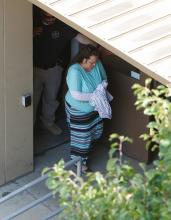christian denominations

IN THE DECADES before the Civil War, three of the nation’s largest Protestant denominations—Baptists, Presbyterians, and Methodists—split over slavery, biblical interpretation, and abolition. Historians have long claimed that these denominational schisms paved the way for a national rift. Once these Protestant churches failed to hold together, breaking into regional bodies of South and North, wrote C.C. Goen in Broken Churches, Broken Nation, “a major bond of national unity” dissolved and hastened America’s warring fate.
As the churches divided over slavery then, so they are dividing over sexuality and gender now. Many of the biblical arguments and hermeneutic approaches once used to support slavery are now employed to reject the humanity, gifts, and dignity of women and LGBTQ persons. If you read 19th century sermons or tracts from Southern Presbyterians, for example, you only need to swap out a few words and you have a blog about how the Bible doesn’t allow women to preach or gay and lesbian couples to marry. Mark Twain once quipped that history doesn’t repeat itself, but it does rhyme. In this case, however, the similarities are so striking that history appears to plagiarize itself.
In recent years, Episcopalians, Lutherans, and Presbyterians have all faced contentious splits over these issues, and now the United Methodist Church—the largest mainline Protestant denomination—is struggling with the same.
History may plagiarize, but it will not repeat. These denominations aren’t as significant as they once were, culturally or politically. The Baptists not only split over slavery but remained permanently divided in Northern and Southern branches, then divided and divided again. The Methodists reunited in the 20th century, as did the Presbyterians. But for all their remarkable contributions, neither denomination regained its former status.

Kim Davis, the Rowan County, Ky., clerk jailed for five days for refusing to issue marriage licenses to same-sex couples, identifies as an Apostolic Christian and attends Solid Rock Apostolic Church in Morehead, Ky.
But what’s an “Apostolic Christian” and why does the group object to same-sex marriage? Let me 'splain:
Q: Who are Apostolic Christians?
A: The term could refer to any one of a few different groups, including the Apostolic Christian Church or the Apostolic Pentecostal movement, also known as Oneness Pentecostalism. Solid Rock’s website was down Sept. 9 and a busy signal greeted anyone trying to reach the church. But it is listed on a worldwide directory of Apostolic Pentecostal churches and ministries.
Today is another intense day of politics at the White House. The debt default deadline is fast approaching. The stakes for the nation are high as politicians can't agree on how to resolve the ideological impasse on how to reduce the deficit before the nation defaults on its financial obligations.
Yesterday, before Congressional leaders were due at the White House for critical negotiations, I, along with 11 other national faith leaders, met with President Obama and senior White House staff for 40 minutes. We were representing the Circle of Protection, which formed in a commitment to defend the poor in the budget debates. Sitting in the Roosevelt Room of the White House, we opened in prayer, grasping hands across the table, and read scripture together. We reminded ourselves that people of faith must evaluate big decisions on issues like a budget by how they impact the most vulnerable.
Yesterday, the leaders of more than 50 Christian denominations and organizations drew a line in the sand of the budget debate, and asked our political leaders to do the same.